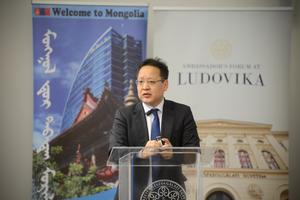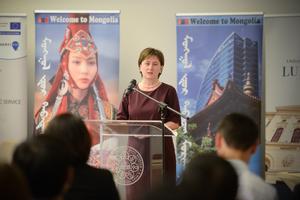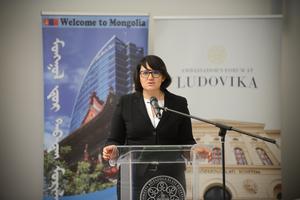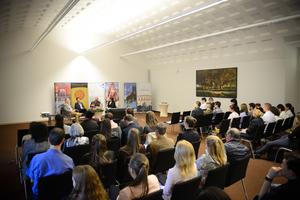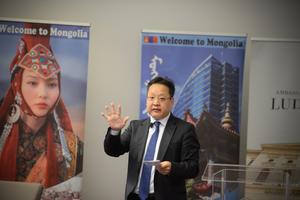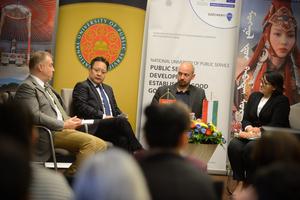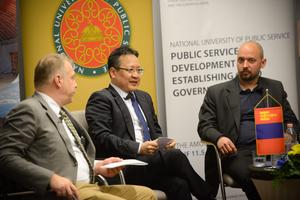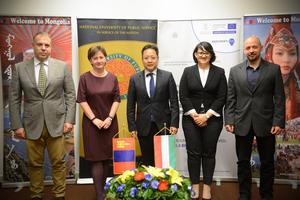H.E. Zeneemyadar Batbayar, Ambassador Extraordinary and Plenipotentiary of Mongolia to Hungary was the special guest of the Ambassador Forum at Ludovika on 11 April who gave a presentation titled “The economics of Mongolia and bilateral relations with Hungary”.
H.E. Zeneemyadar Batbayar is fulfilling his role and represents his country in Hungary since 2016. After 1989, the ambassador came to Hungary to study law at the Eötvös Loránd University. He added that after a one-year language preparatory programme, he studied the university courses in Hungarian. Thanks to this experience, he is now speaking the language on a high level and whenever he needs to talk to Hungarians, he prefers to use Hungarian language instead of English because “brothers and sisters should not speak different languages”. After graduating from ELTE as Doctor of Legal and State Science, he returned to Mongolia where he started working at one of the biggest Mongol companies, and then he became the Deputy Director of the Water Authority. He was appointed as ambassador following his job as secretary of one of the parliamentary party.
The third Ambassador’s Forum at Ludovika event of the semester, organised by the International Relations Office, was opened by Dr. habil. Györgyi Nyikos. The NUPS’ Vice-Rector for International Affairs accentuated in her opening speech that the Ambassador’s Forum at Ludovika is a very important event in the university. She explained that “the event, and especially the special guest, is very popular amongst the students. It is a great opportunity for the university students to get an insight into the world of diplomacy and to get first-hand information about the most recent and important domestic matters and international challenges.”
At the beginning of his speech, His Excellency thanked the opportunity to present at this well-known event. Firstly, the ambassador introduced his country to the audience. Mongolia is the world's second-largest landlocked country. The country’s territory is approximately 1.56 million km2 and it is situated between China and Russia. He also noted that despite its large area, the country’s population is only reaching 3 million habitants. Following the geographic description, the ambassador talked about the economy of Mongolia. He said that the animal husbandry is the mainstay of the Mongolian economy and in 2017 the livestock has even reached 66 million animals. These animals are raised primarily for their meat and are valued for their hair which is the base of cashmere production. Mr. Batbayar added that mining is also an important economic factor, because Mongolia hosts approximately 10% of the world’s known coal reserves at an estimated 162 billion tons.
In the next part of his speech, the ambassador described the Mongolian-Hungarian bilateral relations. He said that the former fruitful relation between the two nations has given Mongolia numerous agricultural and industrial developments, which have a positive impact today. He highlighted that there was a slight break in the relation of the two countries, but these days the cooperation is getting stronger, thus he is looking forward to joint future successes. Finally, the ambassador said that currently around two hundred Mongol students are studying in Hungary, which is a good opportunity to strengthen the cultural relations.
The presentation of His Excellency was followed by a roundtable discussion. The discussion was moderated by Dr. Zsuzsanna Peres, Vice-Dean for Science and International Affairs. The experts of the session were Dr. Ákos Avar, research fellow of the Mongolian and Inner Asian Studies Department and the member of the Hungarian Sheep Breeders Association, and Dr. Sándor Holbok, chairman of the Hungarian Chamber of Commerce and Industry’s Committee for Hungarian-Mongolian Relations. The experts talked about the historical trading relations of the two countries, including the developments made in the processing and enhancement of the vaccination of animals. They also explained that since the '90s the Hungarian-Mongolian foreign trade relations have been dynamically developing and that the two countries are keen on strengthening the cooperation.
